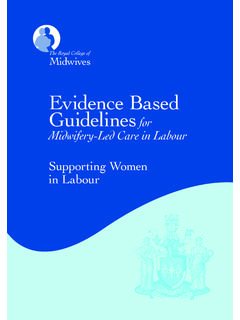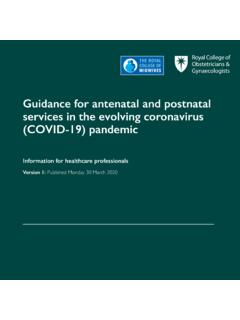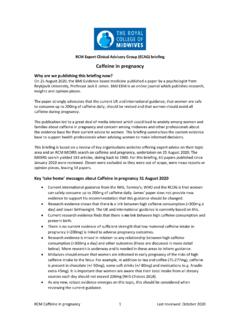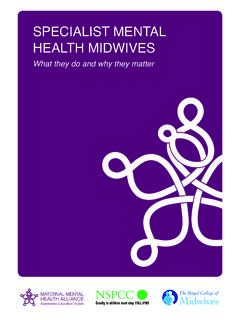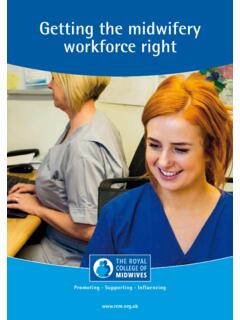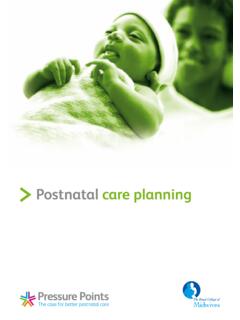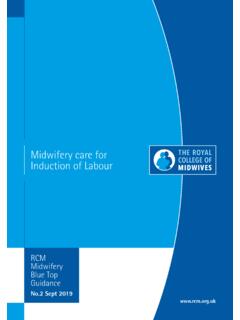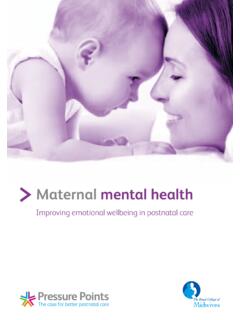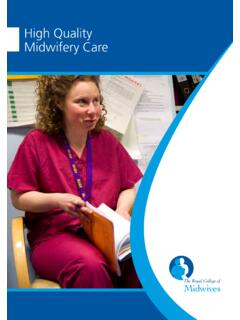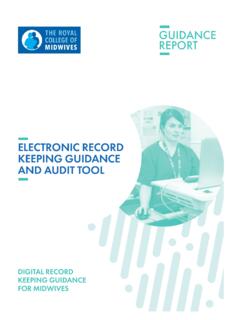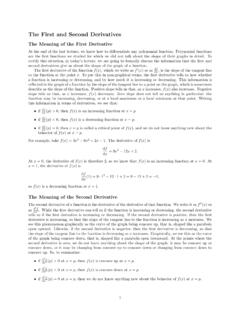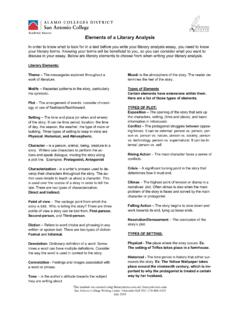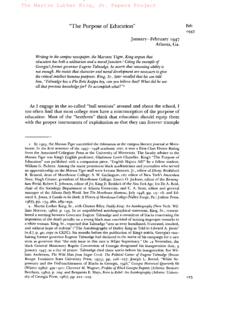Transcription of Position Statement - RCM
1 Promoting Supporting InfluencingPosition StatementSupport to Quit Smoking in PregnancyRCM PositionPosition Statement Support to Quit Smoking in Pregnancy Quitting smoking is one of the best things a woman and her partner can do to protect their baby s health through pregnancy and beyond. Pregnancy is a window of opportunity for significant health improvement. All four UK nations currently have clear policies to reduce smoking in pregnancy and their ambitions can be achieved with adequate resources and political will123456. All midwives and maternity support workers should be confident and competent in discussing smoking in pregnancy, using techniques such as those contained in the very brief advice (VBA) for pregnant women training, delivered through the RCM s i-learn platform7.
2 Specialist stop smoking support should be available for pregnant women in all NHS Trusts and Boards. Specialist stop smoking advisors should be closely aligned with and contain members of the maternity team. Funding for this support must be consistent and sustainable. Given that smoking is a marker of inequality, resourcing arrangements should reflect local need. Specialist stop smoking support should be offered in pregnancy on an opt out basis. Smokers are up to four times as likely to quit successfully using help from a trained practitioner, compared to doing it alone8.
3 Nicotine Replacement Therapy is safe in pregnancy and should be provided in line with evidence-based protocols to women and their partners, to maximise its use as a quitting aid9. E-cigarettes contain some toxins, but at far lower levels than found in tobacco smoke. If a pregnant woman who has been smoking chooses to use an e-cigarette (vaping) and it helps her to quit smoking and stay smokefree, she should be supported to do so. If a woman has switched completely to vaping and is not smoking at all, she should be recorded as a non-smoker. Based on the available evidence on e-cigarette safety, there is no reason to believe that use of an e-cigarette has any adverse effect on breastfeeding.
4 Vaping should continue if it is helpful to quitting smoking and staying smokefree. Innovative and effective models of care, including incentive schemes, should be encouraged and best practice shared. NHS staff who smoke should have access to stop smoking support and be given time off to attend appointments where necessary and appropriate. NHS Trusts must effectively maintain their premises as smokefree Statement Support to Quit Smoking in PregnancyBackground and ContextRates of smoking throughout pregnancy: latest national figuresAcross the UK there is much to be done to reduce rates of smoking amongst pregnant women.
5 15% and 16% of pregnant Northern Irish and Welsh smokers respectively continue to smoke throughout their pregnancy, and over 10% of women in England are recorded as smoking at the time of is significant variation in maternal smoking rates, depending on age, ethnicity and socio-economic status. Rates of smoking in pregnancy in the most deprived areas of England are 5 times those in the least deprived areas (20% and 4% respectively)11. According to the Scottish Index of Multiple Deprivation (SIMD), of pregnant women in the most deprived quintile are smokers at booking, compared to in the least deprived SIMD quintile12.
6 National initiatives to reduce smoking in pregnancy will therefore help to address socioeconomic inequalities in health outcomes. Health effects of smokingSmoking significantly increases the risk of miscarriage, stillbirth, sudden infant death and birth abnormalities. Smoking also damages a mother s health and is associated with maternal risks in pregnancy, such as placental abruption and born to smoking mothers who quit in early pregnancy have rates of stillbirth, prematurity, low birth weight and small for gestational age the same as or close to those of non-smokers.
7 Evidence show that stopping smoking early in pregnancy can almost entirely prevent adverse smoking methods and aidsA carbon monoxide (CO) breath test is offered by midwives to all women at maternity booking and at subsequent appointments, in line with NICE guidance14. Monitors need to be supplied in sufficient numbers to staff and properly maintained. Behavioural support for stopping smoking has been shown to help pregnant women quit15. The RCM is aware that innovative support programmes are achieving good outcomes and that intensive, tailored support requires long term investment.
8 However, a recent RCM survey found almost 70% of Heads of Midwifery were without a stop smoking specialist midwife in their maternity team16. Nicotine Replacement Therapy (NRT) is an effective stop smoking aid and is licenced for use in pregnancy. Whilst studies have not been able to demonstrate its effectiveness in isolation, primarily due to problems with compliance, it is widely recommended in conjunction with behavioural support to help women quit and stay smokefree. The RCM calls for more dedicated research into its effectiveness and safety to build the or vaping are used with increasing frequency by smokers wishing to limit or stop smoking.
9 Recent studies have shown that they are helpful for cessation and there is significantly reduced exposure to harmful toxins if an individual switches completely17. Pregnant women metabolise nicotine faster than other smokers and may need higher nicotine doses delivered at a faster rate than standard NRT formulations18. Although nicotine from vaping crosses the placenta, e-cigarettes do not contain other toxic ingredients found in cigarette smoke. Whilst nicotine is the addictive component within cigarettes, it carries minimal risk of harm to e-cigarettes are not completely risk free, the Royal college of Physicians has estimated that e-cigarettes are likely to carry at most 5% of the risk of smoked tobacco20.
10 They are not harmless, as the vapour they produce contains some toxins, but studies have shown that these are at levels far lower than those found in tobacco smoke. The RCM believes there are strong reasons for testing the safety and efficacy of e-cigarettes as a stop-smoking treatment for pregnant women and a randomised control trial is currently underway. Strong evidence now shows that financial incentive schemes are effective in supporting women to quit, particularly when targeted at communities with high rates of smoking. Such schemes provide vouchers which have encouraged continued engagement with quit programmes and can have wider impact on the households that women live smokefree NHSNHS staff that smoke are more likely to have sickness absence which can significantly impact on delivery of care and workforce planning22.
